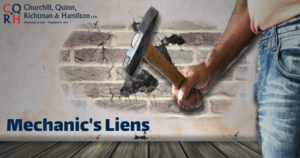Understanding Mechanic’s Liens
When construction or improvements are done on a property, sometimes things do not go according to plan. When problems arise and contracted payments are not made, the situation can result in a mechanic’s lien being filed.
What is a Mechanic’s Lien?
A mechanic’s lien is a “claim” against your property, similar to a mortgage, filed by someone who has done construction or home improvement work on your property such as a contractor, subcontractor, laborer or material supplier. When the contractor or laborer has not been paid, they can record a lien with the county recorder’s office in order to ensure a payment.
How a Homeowner is Affected by a Mechanic’s Lien
The homeowner is the person who is ultimately legally responsible for payment of the lien, even if they have already paid the contractor. Problems that can arise include:
- Not paying the lien can result in foreclosure on the property
- The lien gets recorded on the property’s title, which can affect the ability to borrow against it or sell it
- The homeowner may end up paying twice for the same work
How Mechanic’s Liens Work for a Contractor or Supplier
A mechanic’s lien is a very powerful tool that allows for the ability to receive payment for the goods or services provided by a contractor, subcontractor or supplier. If the agreed-upon work has been completed but payment has not been made, a mechanic’s lien can provide a solution. When Churchill, Quinn, Richtman & Hamilton helps you file the lien, it can benefit you as a contractor/supplier by giving you the ability to legally collect the debt.
- It will prevent the property from being sold, refinanced or transferred
- It can put pressure on lenders and property owners to address the debt
- It can give the debt first priority over other debt
The attorneys at Churchill, Quinn, Richtman & Hamilton are well-versed in the enforcement of mechanic’s liens. Contact us at 847-223-1500 or visit dev-cqrh.pantheonsite.io to learn how we can help you navigate the complexities of this law.
Referenced articles can be read HERE and HERE
